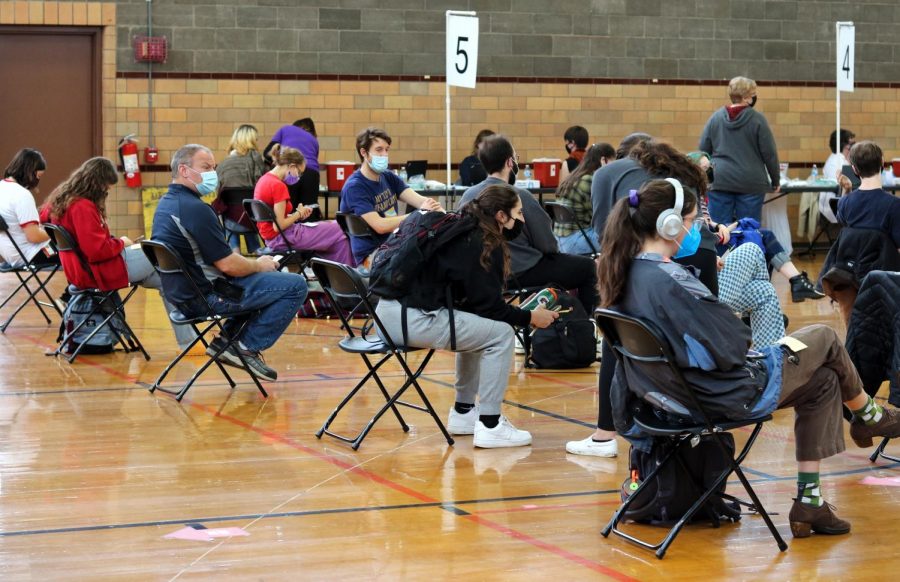Insufficient College COVID-19 Testing Causes Students to Turn to Community Resources
Students who are unable to meet the qualifications for a COVID-19 test from Student Health Services often seek a test from community resources like Mercy Allen Hospital or the Oberlin Public Library’s rapid test program.
This semester, some students have turned to COVID-19 testing resources offered by Oberlin community providers rather than the College. As a result, community providers such as the Oberlin Public Library have struggled with the increased demand. However, the College maintains that its testing protocols and facilities are adequate and meet Centers for Disease Control and Prevention guidelines.
Currently, students who are unvaccinated receive weekly tests from Student Health Services. Students who are symptomatic or who have been exposed to COVID-19 are assessed by Student Health to determine if they meet the CDC criteria for a test. Many students who wanted a test due to exposure or other symptoms were told by Student Health they do not qualify, prompting them to seek tests from other sources.
The OPL provides self-administered COVID-19 rapid tests for anyone who requests one on a first-come, first-served basis. Adult Services Team Leader Rebecca Wedge said that the library typically runs out of rapid tests between shipments and cannot provide rapid tests for every person who requests one.
“We run out of them as soon as we get them,” she said. “We can’t keep up.”
Wedge said that the library’s test distribution doubled between September and October and has probably doubled again since then. Though the library does not track whether test recipients are students, Wedge has noticed an increased number of younger individuals she believes to be students receiving tests. “
I don’t think it’s more students than community members, but I definitely noticed an uptick in the number of students accessing them,” Wedge said.
College second-year Aidan Sweney sought out a COVID-19 test from Student Health after an individual in his dining co-op, with whom he had dined in the same room, tested positive for COVID-19. However, according to Sweney, Student Health did not fulfill his request because he had no COVID-19 symptoms and had not spent an extended time unmasked within six feet of the individual who tested positive.
“Everyone’s eating together and cleaning together,” he said. “I would have expected the College to be more concerned.”
Sweney took a self-administered rapid test he received from another coop member that he said he believed had been purchased online. Although he did not attempt to access Oberlin community COVID-19 resources, he heard from other co-op members in similar situations that the OPL and Oberlin CVS were out of COVID-19 rapid tests. Although he said that contacting Student Health had been his first choice to receive a test in this situation, he said that he might be more averse to utilizing Student Health’s COVID-19 resources in the future.
“It’s a lot less likely that I would go straight to the College,” he said.
According to Campus Health Coordinator Katie Gravens, students who are not symptomatic, have not been officially contact-traced by the College, and do not meet CDC definitions of close contact with a COVID-positive individual will not always have access to a College provided COVID-19 test. Gravens believes these testing protocols fulfill the needs of the College’s current COVID-19 situation.
“There is adequate symptomatic testing,” she said. “I have not gotten reports of any student being tested off-campus. If they are, they must be testing negative because we’re not hearing about it.”
According to Gravens, Oberlin College Chief of Staff David Hertz speaks with the Oberlin City Manager, Rob Hillard, every week and has not received any complaints about Oberlin students accessing community testing resources. However, in October, concerns regarding COVID-19 prompted 12 students to request COVID-19 tests from Mercy Allen Hospital, after which the hospital requested a meeting with Gravens. According to Gravens, Student Health could not handle increased demand for COVID-19 tests, so the College reinstituted Mercy Allen Hospital into Hales Gymnasium to meet demand and alleviate their concerns. Gravens has since confirmed with the hospital that the College has resolved the issue.
“We had a quick meeting,” she said. “I told them how we were addressing [it], and they’ve had no complaints.”
Gravens also said that students might believe they had close contact with an individual who tested positive even if they did not have close contact per CDC guidelines. Although these students may request COVID-19 tests from the College, Gravens said she wants to reserve resources for symptomatic students or for those who meet the CDC definition of close contact.
“The supply is limited, which again is where we say, ‘Let’s keep our resources for students who truly need it,’ because they are identified as symptomatic or a true close contact, as opposed to it being based on fear,” she said.
Gravens emphasized that the College monitors relevant data, maintains contact with public health officials, and follows public health guidelines. So, she wishes that more students would trust the College’s testing protocol.
“I think you have people at Oberlin who truly care about the health and safety of the campus, but we want you to focus on enjoying the experience and we will look at keeping you safe,” she said.
According to Gravens, the College is prepared to adjust testing protocol if it encounters a change in its current COVID-19 situation. However, she says that there is no need for a policy shift right now.





